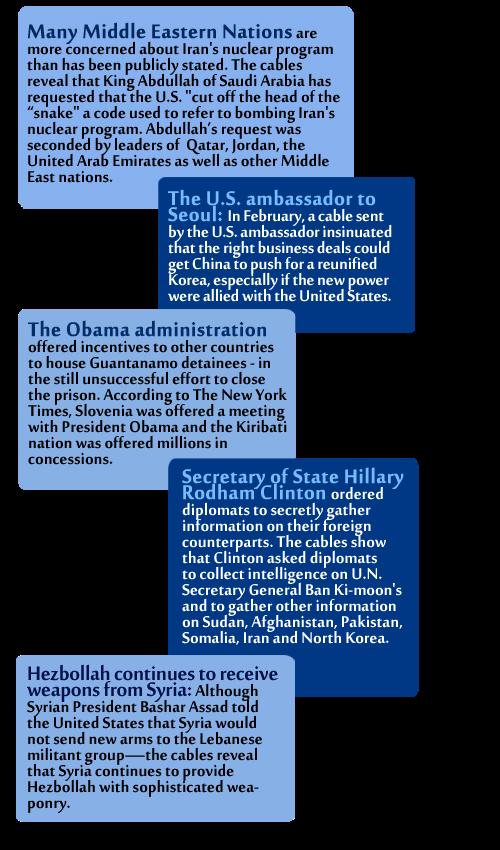Over 250,000 leaked United States embassy cables. The largest volumes of confidential documents ever released into the public domain. A plethora of embarrassing information.
Confidential documents continue to be made public by WikiLeaks in the latest release of classified U.S. diplomatic cables — the largest unauthorized release in U.S. history.
Some of the cables, which are like telegrams, have caused international ripples in the international community and have shown the world the under-workings of U.S. diplomatic relations.
“Governments have a duty to protect secrets of national security, but not illegal behavior,” said President and Professor of Political Science Kent Chabotar. “The people’s right to know is majestic in its breadth, but not absolute. It all comes down to trust, which is low at the moment, making leaked documents all the more likely.”
According to WikiLeaks, the secret documents tell a story of deceit and wanton behavior on the part of the United States towards other countries.
Summing up the contents in a press release, WikiLeaks announced that: “the cables show the extent of U.S. spying on its allies and the U.N.; turning a blind eye to corruption and human rights abuse in ‘client states’: back-room deals with supposedly neutral countries; lobbying for U.S. corporations; and the measures U.S. diplomats take to advance those who have access to them.”
Among the 250,000 documents made public, some of the most revealing cables have centered around U.S. relations in the Middle East and the Koreas, and operations involving Guantanamo, and use of U.N. diplomacy to gather information, according to WikiLeaks.org.
Chair and Associate Professor of Political Science Ken Gilmore told The Guilfordian that the greatest effect of these releases will center around the future ability for American diplomats to gather information for the United States.
“For a diplomat, sources and relationships with those sources are everything,” said Gilmore. “You need people who feel safe in providing you with honest, unvarnished information and opinion. Once that is compromised, your job becomes that much more difficult.”
Gilmore said that some of the leaks could impact U.S. relations in the Middle East and Asia, although some of the revelations may verify what has already been known.
“I’m not sure if the average cab driver in Cairo or Seoul couldn’t have told you that the Egyptians are afraid of Iran,” said Gilmore. “And that no one knows what to do about the crazy North Koreans.”
Sophomore Ben Heide, a peace studies major who is studying abroad in Munich, said he agreed with Gilmore that much of what has been released is little more than gossip.
“We need to be honest with each other,” said Heide. “I think it (the recent leaks) forced undiscussed issues to the front burner.”
In a Dec. 1 U.N. press release, Ambassador Susan Rice of the United States responded to questions about fallout from the WikiLeaks revelations and whether the incident was affecting her work at the United Nations.
“That is not the case,” said Rice, according to the press release. “United States diplomats were undertaking their traditional work with their partners to solve wide-ranging issues at the United Nations.”
Rice said that the recent news had not diminished her office’s ability to carry out its everyday duties.
According to a Nov. 28 press release from the White House, President Obama supports responsible, accountable, and open government at home and around the world.
However, the White House said WikiLeaks was not to be lauded.
“We condemn in the strongest terms the unauthorized disclosure of classified documents and sensitive national security information,” the press release said, according to the Dec. 1 release. “This reckless and dangerous action runs counter to that goal.”
The press release continued: “by releasing stolen and classified documents, WikiLeaks has put at risk not only the cause of human rights but also the lives and work of these individuals.”
Deena Zaru ’10, told The Guilfordian in a facebook interview from Palestine that she thought WikiLeaks was correct to air the information.
“I believe that we are entitled to certain information,” said Zaru. “However, certain precautions need to be taken when publishing delicate information.”
Zaru said if WikiLeaks cables do really lead to national security threats, that information should be handled with asbestos gloves, but the United States should be more transparent with its citizens.
“These threats need to be exposed some way or another so that they can be dealt with,” said Zaru. “These threats are based on deeply rooted issues between nations that need to be worked out and feeling threatened might be a good incentive for them to work their issues out.”
Gilmore, however, said that the latest batch of documents WikiLeaks released could be a gamble with other peoples’ lives.
“The information released could potentially jeopardize the lives of human rights advocates, critics of authoritarian rule, and others who should have our support,” said Gilmore. “This latest batch of documents seems to do both, expose and jeopardize. So I have mixed feelings.”
However, Gilmore is uncertain about the need for the latest release. He told The Guilfordian that the greatest implication of the leaks is the nature and responsibilities of the free press.
“A case could be made that WikiLeaks represents the best aspects of a free press, in the tradition of Daniel Ellsberg and the Pentagon Papers,” said Gilmore. “Clearly that was true of WikiLeaks when it came to documents on the Iraq War.”
Daniel Ellsberg made the Pentagon Papers available to The New York Times, detailing attacks taking place in Vietnam that were known to the United States but not publically released.

